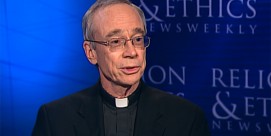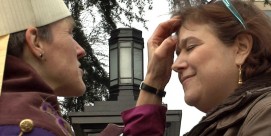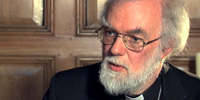In This Episode << SLIDE LEFT TO SEE ADDITIONAL SEGMENTS
Bishop Tom Shaw
Read more of Kim Lawton’s interview at the Lambeth Conference in Canterbury with Bishop Tom Shaw of Massachusetts:
Q: What has been your impression here at Lambeth, in the midst of so much diversity?
A: I think my impression overall so far is that, unlike the last Lambeth when I was here, there’s been a tremendous opportunity for people to talk and to share their theological views, their views about mission, and the people have been listening to one another, in some pretty deep ways, on the work that we do together.
Q: The format was different this year — no legislation, no voting, and all of that. How did that change the tone or the content of the meeting?
A: I think it’s changed the meeting in that people seem much more willing to listen to each other than they were in the past when there was legislation that we had to face and you were either for it or you were against it. This one seems to allow for more dialogue so far.
Q: We know some tough issues have been on the table, and some controversial subjects have been raised, especially about the US Church. How is the rest of the Communion seeing some of the things that are happening in the US?

Bishop Tom Shaw |
A: I think up until a certain point I was encouraged because of the conversation, the way people were listening to one another. I think when the hearings on the Windsor Report have come up in the conference, that’s not going to help the conversation, and it feels to me as though we’re getting back into a juridical understanding of how we’re going to be one Communion, and I think that that’s the wrong way for us to be examining the kinds of issues that we face.
Q: What kinds of things are you hearing? What are some of those tough issues that are really causing tensions?
A: Well, I think the toughest issue is human sexuality and I think that that’s — there are lots of other issues that are around that issue, but that’s the one that seems to be the hot point for everybody.
Q: And what are you hearing from your fellow bishops on that issue?
A: Well, you hear the whole spectrum, from people that basically agree with the role that the American church has taken in examining this issue, and people that disagree with us but still want to work together in mission and still want to be in Communion, and then there are those parts of the Communion who feel that the Episcopal Church has gone too far, and they want us to leave the Communion or be part of it in a different way.
Q: How is that working out in the dialogue? Is it frustrating relationships?
A: Well, for me whenever we move into that place where we’re talking about the juridical aspects of this, it makes me think that we’re not going to move forward as a Communion and that we’re not going to be able to be patient with one another, we’re not listening to one another and really taking an issue that’s a huge issue, that represents a whole lot of other issues, and try and talk them through.
Q: It does seem like there’s almost a stalemate. Do you see any forward motion, or does it feel like the same arguments over and over again?
A: Well, it depends on the day you talk to me. On some days I’ve had really significant conversations with individual bishops and groups, and I get a sense that we really are listening to one another and trying to find a path forward, and then on other days it doesn’t seem like really talking to one another, and it’s hard for me to see how we can go forward.
Q: How much is the Anglican identity at stake, what it really means to be an Anglican today?
A: I think part of being an Anglican is not being a confessing church but being a catholic and a community church, and I think that if we were to become a confessing church, by not allowing for the breadth of opinion and the breadth of interpretation of Scripture, that that would really threaten our Anglican identity.
Q: Do you get a sense here of great diversity, not just ethnically but also theologically or ideologically? With your fellow bishops do you get that sense of the bigness of the Anglican Church?
A: Oh, yeah. I’m in a fascinating Bible study, studying the Bible with people of Africa and from New Zealand and from Great Britain and from the United States and from Japan, so I do every day, and in going over Scripture I get of sense of the breadth of the Anglican Communion, and it’s exciting, and it’s challenging.
Q: And in a global, fast-changing world is that difficult, then, to work out under the Anglican umbrella?
A: Well, I think that’s the challenge that we’re facing, ultimately, is how are we going to be this Anglican Communion, how are we going to be this Anglican Communion in the 21st century? That’s the real question behind all the disagreement over Scripture and about human sexuality and all the rest of it is how are we going to do this in the future with the challenges that we have in the 21st century?
Q: A lot of people aren’t here. A significant group of bishops aren’t here. Some are boycotting, some weren’t invited. What does that say about the challenges?
A: Well, I think that the most unfortunate thing is that we miss their voices. We miss something of the breadth of the Anglican Communion, whether it’s Gene Robinson who hasn’t been invited or whether it’s members of GAFCON [Global Anglican Future Conference] who decided not to come. Those voices would be tremendously important to this conversation that we’re trying to have. But I also have to say that the conversation goes on, and it’s still very, very fruitful.






